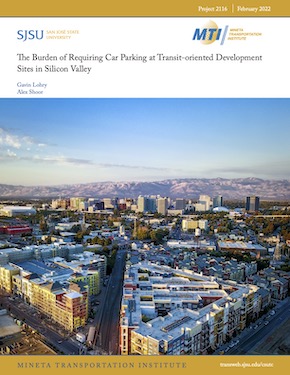- 408-924-7560
- mineta-institute@sjsu.edu
- Donate
The Burden of Requiring Car Parking at Transit-oriented Development Sites in Silicon Valley
While people in Silicon Valley get around using various modes, and billions of dollars are spent supporting public transit, development near transit is planned primarily to account for single-occupancy automobiles. Car parking minimums set by cities often dictate this narrow scope. Yet, these requirements have all manner of negative consequences, which will be addressed in this paper. In place of these minimums, the authors outline different transportation strategies that cities and developers can implement in new developments to make communities more accessible, affordable, vibrant, and healthy. In this research, the authors analyze data on 21 transit-oriented housing developments (TOD) in Silicon Valley that have been reviewed since 2017. In this paper, the authors look back at these projects, including their parking ratios, how close they are to particular types of transit, if they are affordable or market-rate housing, and any Transportation Demand Management (TDM) measures developers committed to implementing. The authors find that developers capitalized on rules allowing them to reduce parking, and some took a proactive approach to reduce required parking by implementing TDM measures. Analysis shows that many developers want to build less parking than required. Changing parking policy can reduce the amount of parking built, lower the cost of housing, and encourage more sustainable forms of mobility. Key recommendations include: eliminating parking minimums, imposing parking maximums near transit, requiring bicycle and micromobility parking minimums, unbundling parking, and future-proofing structured parking. To offset the reduced parking and encourage other ways of getting around, the authors recommend TDM measures be required, and recognize that bicycle facilities, transit passes, and commercial/retail on ground floors encourage sustainable transportation choices and help create vibrant neighborhoods.
ALEX SHOOR
Alex Shoor is the Executive Director for Catalyze SV. He serves on San José's Housing & Community Development Commission and the Advisory Board of the Silicon Valley chapter of New Leaders Council. Most recently at the communications and public engagement consulting firm Katz & Associates, Alex worked with the Valley Transportation Authority on the extension of BART into Silicon Valley. He has also been a policy aide for a Santa Clara County Supervisor and a Director of Government Affairs for a Bay Area nonprofit organization. Alex studied Political Science and African American Studies while earning a BA from Vanderbilt University and holds a Master of Public Administration from the University of Southern California.
GAVIN LOHRY
Gavin Lohry was the Development Manager at Catalyze SV. He is a recent graduate of the Master's in Urban Planning program at San José State University. Before attending San José State University, Gavin launched and managed operations for a regional bike share program, where he helped provide a sustainable transportation alternative for residents of San José, San Francisco, and East Bay cities. Before moving to the Bay Area, he worked on transportation and urban development issues in China and served as an Engineering Sergeant with the United States Air Force. Gavin also holds an AS in Construction Technology, BA in Business and Policy, MPA in International Development, and Certificate in Real Estate Development.
-
Contact Us
San José State University One Washington Square, San Jose, CA 95192 Phone: 408-924-7560 Email: mineta-institute@sjsu.edu






